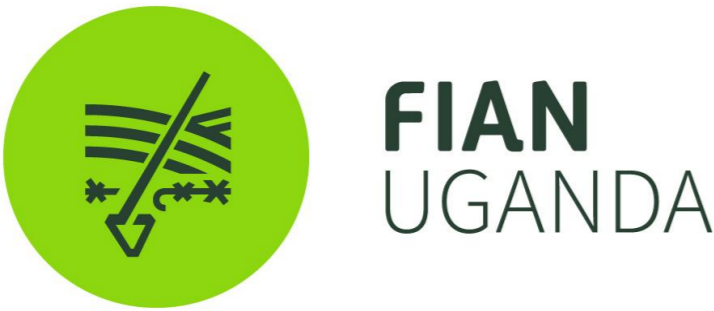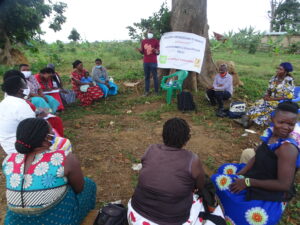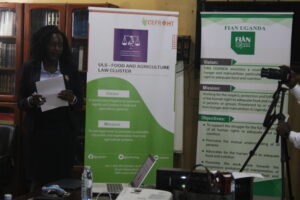No products in the cart.

When the SUN casts a shadow: Which way for Uganda?
When the SUN casts a shadow: Which way for Uganda?
Launched in 2010 at a high-level meeting of the International Monetary Fund (IMF) and the World Bank (WB), SUN brings together governments, UN agencies, donors, businesses and
civil society in a “collective action to improve nutrition”. The movement is a reflection of evolution from governmental and intergovernmental governance to what is being referred to as multi-stakeholder dialogues, programmes andplatforms. 62 countries have, as of date, subscribed to SUN and the initiative has gained substantial political and financial backing. Uganda joined the SUN Movement in March 2011 with the
Office of the Prime Minister (OPM) as the convening body of the initiative in Uganda. The same office is directly responsible for the coordination of the Uganda Nutrition Action Plan
(UNAP), which was approved by Cabinet and launched by the President in November 2011.
SUN is an acronym for Scaling up Nutrition (SUN). The motivation or incentive for the
initiative is: good nutrition is the best investment of the future. SUN’s call is for a greater
‘multi-sectoral’ action on nutrition during the first critical 1000 days of a child’s life, starting
at pregnancy.
Understanding the Policy Problem:
The past two decades have seen an increased interest and participation of the private sector, particularly large transnational corporations, in global policy debates on sustainable development. Such engagement has generated, and continues to generate, polarizing
perspectives: some view this as an opportunity for greater policy effectiveness and resource mobilization; others are concerned about corporate capture of the public policy space.
Critical questions to consider would be:
• Has SUN really raised the profile of nutrition at global level?
• Or has it opened unprecedented access to the public policy domain for the private sector (corporate capture of public space) thus allowing undue influence?
• From a human rights perspective, what are the implications and possible risks generated by SUN with respect to the advancement of the nutrition agenda and the re-architecture of the governance of nutrition, with a focus on the national level?
The Study: When the SUN casts a shadow
The SUN study was a country research in Uganda, Guatemala and three (3) states in India. It explores how the shift from governmental and intergovernmental governance to multistakeholder platforms influences:
i) public policy spaces;
ii) the framing of agendas;
iii) the capacity and political will of governmental and intergovernmental institutions (such as the UN) to regulate in the public interest; and
iv) people’s ability to claim their human rights, with special but not exclusive
reference to the right to adequate food and nutrition (RtAFN).
In Uganda, besides documentary analysis of key documents, data collection included in-depth
interviews with key actors, questionnaires targeting health workers, and focus group discussions with mothers/caregivers of malnourished children. In total 36 interviews were held with representatives from the government (eight main sectors and Office of the Prime Minister), including the SUN focal point, donors, UN agencies, civil society, and private sector.
Emerging Issues and Recommendations
The RtAFN has been recognized in provisions of a number of international standards, including: Art. 25 Universal Declaration of Human Rights (1948); Art. 11 International Covenant on Economic, Social and Cultural Rights (ICESCR, 1966); Arts. 1(2) & 6 International Covenant on Civil and Political Rights; Arts. 12(2) & 14(2)(g)(h) Convention on the Elimination of All Forms of Discrimination against Women (CEDAW, 1979); Arts 24 (c)(e)
& 27 Convention on the Rights of the Child (CRC, 1989); and Arts. 14, 25 and 28 Convention on the Rights of Persons with Disabilities (2006).
Nutrition interventions in Uganda are coordinated by the Office of the Prime Minister. Eight government sectors/ministries are involved: Public Service; Agriculture, Animal Industries & Fisheries; Health; Education & Sports; Trade and Cooperatives; Gender, Labour & Social
Development; Local Government; and Finance, Planning & Economic Development.
Membership of the SUN Multi-Stakeholder Platform involves the above-mentioned government sectors, academia, UN agencies, the private sector, and civil society.
Key Finding 1: SUN promotes nutrition approaches favouring short-term medicalized and
technical solutions, mostly focused on micronutrient deficiencies, rather than addressing the
structural causes of malnutrition in all its forms.
Key Finding 2: SUN’s nutrition-sensitive interventions promote high-input intensive agriculture, including biofortified crops, that primarily benefits the agro-industrial food system
Key Finding 3: SUN inspired interventions showed to have limited impact on reducing malnutrition while adversely affecting local food cultures and creating dependencies
Key Finding 4: SUN enhanced private sector policy influence in disregard of conflicts of interest
Key Finding 5: SUN generated the benign illusion of a broad and inclusive movement while
in practice being detached from those affected by hunger and malnutrition
Uganda, a country that was once described as the food basket of Africa, is now highly dependent on donor funding for nutrition.
The Government of Uganda has chosen to base its nutrition policy on SUN’s framework and has introduced significant changes to the institutional framework for nutrition in an effort to comply with SUN’s multi-stakeholder requirement.
The Ugandan case studies show promotion of short-term nutrition interventions with a strong emphasis on medicalized, product-based interventions aimed at treatment rather than the prevention of malnutrition. These interventions have so far failed to bring meaningful changes to the nutrition situation of those affected by malnutrition.
Recommendations:
➢ To Government
F Carry out a human rights impact assessment of current nutrition interventions in terms of their contribution to advancing the RtAFN and related rights. Consider a meaningful participation of communities most affected by hunger and malnutrition in the assessment;
F Revisit the Country’s current nutrition strategy based on the results of the human rights impact assessment;
F Establish clear and enforceable guidelines on nutrition interventions. There is need for a precautionary approach with regard to technical interventions, such as biofortification, which present potential serious risks to the country’s biodiversity, peasants’ rights, the RtAFN, and the right to health, among others.
F Protect the public policy space from undue influence of private sector and organizations
promoting private sector interests. Put in place effective conflict of interest safeguards
developed with the support of independent experts and public interest advocates.
F Support the development of Guidelines on Food Systems and Nutrition in the context of the Committee on World Food Security and ensure that they are in line with the RtAFN.
F Fast-track the passing of the Food and Nutrition Bill into law.
➢ To donor countries supporting SUN
F Support national level efforts to: (a) implement participatory assessments of the impact of current nutrition interventions, (b) develop and implement new action plans that also address structural causes of malnutrition, and (c) monitor the impacts and implementation processes of nutrition actions and their compliance with human rights.
F Mindful of the extraterritorial human rights obligations, ensure that all programmes and
projects aimed at improving nutrition which are supported by international development cooperation contribute to the realization of human rights and do not harm human rights.
F Redirect funding from technical short-term interventions towards more long-term strategies that address the structural barriers people face in nourishing themselves and their families in a dignified way. This includes a fundamental shift towards public policies and public investments that enable the transition to food systems based on agroecological
principles and include support for community-driven initiatives.
➢ To UN agencies and their member countries
F UN agencies and member should as of duty ensure that initiatives they support in the context of international cooperation on nutrition and policies affecting nutrition, contribute to the protection and realization of human rights.
F Support national level efforts to: (a) implement participatory assessments of the impact
of current nutrition interventions, (b) develop and implement new action plans that also address structural causes of malnutrition, and (c) monitor the impacts and implementation processes of nutrition actions and their compliance with human rights.
F Apply a vigilant arms-length approach to the engagement with the private sector. Support and highlight the need for countries to protect their public policy spaces from undue influence of the private sector.
F Abstain from recommending multi-stakeholder approaches in nutrition and other policy fields that place all actors at the same level and fail to recognize differences between actors based on their interests, roles, power, and legitimacy.
➢ To civil society organizations
F Worked towards a united civil society working on nutrition and engage in constructive and frank dialogue within the SUN Civil Society Network and with organisations outside of SUN to address the gaps identified in the study.
F Gather the views of local CSOs and communities with regard to the barriers they face and critically assess whether interventions promoted through SUN or based on SUN’s approach, actually contribute to reducing these barriers.



